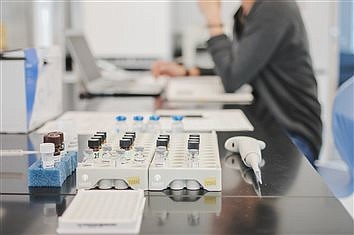K21 Grants Over $230K To Research At Lilly Center
July 27, 2020 at 10:12 p.m.

K21 Grants Over $230K To Research At Lilly Center
By Staff Report-
The grant totaled over $230,000 and is specifically for blue-green algae research, analysis and reporting, according to a news release from the Lilly Center.
“Years ago, we were among the first to invest in the Lilly Center’s blue-green algae research,” said Rich Haddad, president and CEO of K21. “Their work parallels our mission to improve the health of our community. We look forward to discovering more about blue-green algae toxins alongside the Lilly Center.”
Funded primarily by K21, the Lilly Center’s current blue-green algae research involves a notification system that will allow community members to find out if the harmful toxin has been detected in 14 local lakes, including 12 all-sport lakes, as well as the county’s seven public beaches.
“To this point, thanks in large part to K21, we’ve trained our research team, started weekly summer lake sampling and started to gather toxin results from in-house water testing,” said Adrienne Funderburg, research program specialist. “There’s still more work to be done!”
In the future, the Lilly Center plans to conduct more targeted blue-green algae bloom sampling as the blooms increase over the summer. This will allow the Lilly Center to analyze the differences between “normal” blue-green and toxin levels, and less-predictable blue-green algae “events,” the release states.
“We look forward to continued partnership with the foundation and maximizing their generous three-year grant for the benefit of our community,” stated Dr. Nate Bosch, director of the Lilly Center.
The Lilly Center has conducted scientific research on over 30 streams and 40 lakes in Kosciusko County. Every summer they collect water samples from 14 lakes and seven public beaches. In the coming years, an important goal of the current project is a proactive science-based notification system that alerts the public to the potential health risks presented by blue-green algae toxins.
More news will be released as the system is developed.
Right now, residents can check the Lilly Center’s website to see weekly readings at lakes.grace.edu.
The grant totaled over $230,000 and is specifically for blue-green algae research, analysis and reporting, according to a news release from the Lilly Center.
“Years ago, we were among the first to invest in the Lilly Center’s blue-green algae research,” said Rich Haddad, president and CEO of K21. “Their work parallels our mission to improve the health of our community. We look forward to discovering more about blue-green algae toxins alongside the Lilly Center.”
Funded primarily by K21, the Lilly Center’s current blue-green algae research involves a notification system that will allow community members to find out if the harmful toxin has been detected in 14 local lakes, including 12 all-sport lakes, as well as the county’s seven public beaches.
“To this point, thanks in large part to K21, we’ve trained our research team, started weekly summer lake sampling and started to gather toxin results from in-house water testing,” said Adrienne Funderburg, research program specialist. “There’s still more work to be done!”
In the future, the Lilly Center plans to conduct more targeted blue-green algae bloom sampling as the blooms increase over the summer. This will allow the Lilly Center to analyze the differences between “normal” blue-green and toxin levels, and less-predictable blue-green algae “events,” the release states.
“We look forward to continued partnership with the foundation and maximizing their generous three-year grant for the benefit of our community,” stated Dr. Nate Bosch, director of the Lilly Center.
The Lilly Center has conducted scientific research on over 30 streams and 40 lakes in Kosciusko County. Every summer they collect water samples from 14 lakes and seven public beaches. In the coming years, an important goal of the current project is a proactive science-based notification system that alerts the public to the potential health risks presented by blue-green algae toxins.
More news will be released as the system is developed.
Right now, residents can check the Lilly Center’s website to see weekly readings at lakes.grace.edu.
Have a news tip? Email info@whitewaterpublications.com or Call/Text 360-922-3092
Local Events
